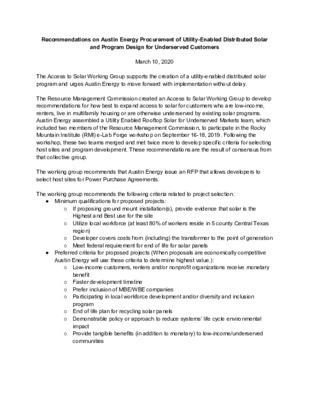Item #5 Solar Working Group — original pdf
Backup

Recommendations on Austin Energy Procurement of Utility-Enabled Distributed Solar and Program Design for Underserved Customers March 10, 2020 The Access to Solar Working Group supports the creation of a utility-enabled distributed solar program and urges Austin Energy to move forward with implementation without delay. The Resource Management Commission created an Access to Solar Working Group to develop recommendations for how best to expand access to solar for customers who are low-income, renters, live in multifamily housing or are otherwise underserved by existing solar programs. Austin Energy assembled a Utility Enabled Rooftop Solar for Underserved Markets team, which included two members of the Resource Management Commission, to participate in the Rocky Mountain Institute (RMI) e-Lab Forge workshop on September 16-18, 2019. Following the workshop, these two teams merged and met twice more to develop specific criteria for selecting host sites and program development. These recommendations are the result of consensus from that collective group. The working group recommends that Austin Energy issue an RFP that allows developers to select host sites for Power Purchase Agreements. The working group recommends the following criteria related to project selection: ● Minimum qualifications for proposed projects: ○ If proposing ground mount installation(s), provide evidence that solar is the Highest and Best use for the site ○ Utilize local workforce (at least 80% of workers reside in 5 county Central Texas ○ Developer covers costs from (including) the transformer to the point of generation ○ Meet federal requirement for end of life for solar panels ● Preferred criteria for proposed projects (When proposals are economically competitive Austin Energy will use these criteria to determine highest value.): ○ Low-income customers, renters and/or nonprofit organizations receive monetary ○ Faster development timeline ○ Prefer inclusion of MBE/WBE companies ○ Participating in local workforce development and/or diversity and inclusion ○ End of life plan for recycling solar panels ○ Demonstrable policy or approach to reduce systems’ life cycle environmental ○ Provide tangible benefits (in addition to monetary) to low-income/underserved communities region) benefit program impact The working group recommends the following criteria be used to develop the energy user side of the program: ● Subscription model ● Provide cost savings for lower-income customers (200% of federal poverty level and below) ● Extra outreach to renters ahead of program opening for subscriptions